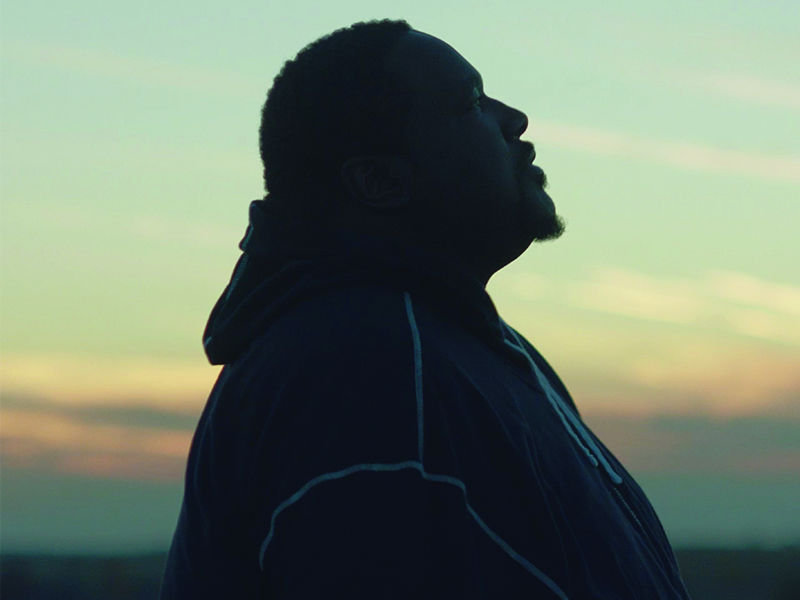There are a lot of hopes running through an actor’s mind when he nabs his first leading role in a Hollywood movie. He hopes it’s a good movie. He hopes he remembers all of his lines on set. But perhaps most of all, he hopes it’ll be a strong introduction to the rest of the world, one that makes people want to spend more time with you – and your characters – in the future.
So when that first lead role turns out to be in a record-breaking, critically applauded, Best Picture-nominated box office smash, that’s quite the introduction.
That’s just what happened to actor Quinton Aaron, most recognized as Michael Oher in the Oscar-winning sports drama "The Blind Side." But while he calls the project "a blessing," he also hopes it’s just the beginning.
"Do I think I’m going to do anything better than ‘The Blind Side’? That’s very hard to say. But as far as my own performances, I think there’s a lot more to me than people have seen thus far, and I can’t wait to show the world what else I can do," the 32-year-old actor said.
"Halfway," one of the Milwaukee Film Festival’s Spotlight Presentations, is a part of that continuing mission. Aaron, who also serves as an executive producer on the film, stars as Byron, a young parolee looking for a new start in the Midwestern solitude of Montfort, Wisconsin (played in the film by the actual Montfort, Wisconsin).
The drama has its final screening Tuesday night at 9:45 p.m. at the Downer Theatre – complete with Aaron in attendance. Before then, OnMilwaukee chatted with the actor about why the script spoke to him, filming – and bowling – in Wisconsin and what’s next.
OnMilwaukee: What about the story and the character in "Halfway" really drew you to the film?
Quinton Aaron: I loved the idea of where this guy came from and the second chance that he was given, so to speak. Even though that it was completely outside of his comfort zone, it was something he wasn’t used to, he was forced into an opportunity to step up and become a better man than he was before.
And I love the message of what that character portrays because so many youth are in positions where they get that second chance, but they don’t take advantage of it – or they don’t really know how to take advantage of it. I feel like this story can give that example that you’ve made some mistakes that landed you in jail, and now you’re out; don’t fall down that same path of going toward the stuff that got you put in in the first place. Let’s try something else. Let’s try to better ourselves. Let’s learn from our mistakes and do better. And I think that’s what this character says overall in this movie, so that’s what I love about it.
Did you do any research or anything to get into the mind and reality of this character?
It wasn’t so much research; it was just living life. I know people that was just like my character. I grew up around people – some of them were in my family – just like the character. So it was my own life experiences that I drew from to get pulled into that.
And then having to start over fresh in completely unfamiliar territory and learning to adapt and wanting to adjust but not knowing how, that’s not unfamiliar with me personally. So it was pretty cool to dredge from my personal experiences toward building a character in this one.
Wisconsin doesn’t get a lot of film productions out here, but "Halfway" was filmed up in Montfort. Why was Wisconsin such a key place for this particular story?
The writer and director, Ben Caird, his family farm is actually where we shot it at. Ben’s British, but his mother is from Wisconsin, and their family farm was the farm we used in the movie in Montfort. So that’s what brought us out here.
What do you think that brought to the film?
It was pretty cool because, in another world, we’re kind of telling his story. But I’m playing him. (laughs) The story relatively changed a little, but it is that fish-out-of-water tale, and it has some similarities to when Ben came to America to live out here with his mom and living on this farm. It was completely unfamiliar territory for him being from London. It has some similarities in that sense.
I don’t know if there’s much nightlife in Montfort, but did you guys get to do any fun Wisconsin things while you were here filming?
Yeah, there were a couple of cool spots. There was a bowling alley up there, and for the month I was out there, I bowled on the league every Monday night with the fellas. It was cool because the whole town, they either bowled or they go to the bar. (laughs) So that was cool. Every Monday night, we were at the bowling alley having a blast, having good food and having drinks and bowling.
For the other nights, there was this bar called Sheddy’s that we hung out and got together at, shot pool, drank, danced. It was fun! I had a blast.
Are you a good bowler or still a work-in-progress?
Oh yeah. Bowling is my sport. That’s the only sport that I feel I can talk trash at. (laughs) I actually beat (Los Angeles Clippers point guard) Chris Paul a couple of years ago.
Really?!
He had a celebrity bowling tournament for his foundation, and they had this celebrity shootout where it was all the celebrities having a shootout, frame for frame. And I wound up winning, and I took down Chris Paul at the end. I don’t think he was happy about that. (laughs)
You’re not just the star of "Halfway"; you’re also an executive producer. And over the last few years, there’s been a lot of discussion about diversity in Hollywood, both in front of the camera and behind it. Do you feel Hollywood is improving with that?
I try not to get involved with any of that. Growing up, my mom always taught me to stay away from politics or religion (laughs) so I never really got involved in those.
Also, in a sense, I found this from how my mom used to be and how I am: If people like you, they’ll do more for you. The best thing you can do is stay humble, keep your head down, work hard and the right opportunity will come to you. I’m a Christian, and I do believe that a lot of the stuff that I’ve been blessed with in this life is because of God. I feel like he’s going to continue to keep opening doors for me as I go along. Regardless of what’s going on in Hollywood, whether there’s not roles being created, I think people should just learn to humble themselves more and be appreciative for what they do get.
And go out and create more stuff for yourself. I don’t always just sit there and wait for people to call me for it; I’m a creative thinker, and I like to develop stories that I can work on and step into that aspect. I have scripts out there that are being written right now as we speak actually for characters I’d like to play that I probably wouldn’t have a chance to play otherwise. It’s all just about thinking outside the box. If you don’t see the role out there that you want as a black man or a black woman, go out there, put your hands together with some people and create it. Then play it. Show them that you can do that, and then maybe they’ll say, "Oh my God, I didn’t know you could do that," or "I didn’t know she was capable of that." And then those opportunities will come to you because you’ve shown people more than what they saw you for.
You talked about other projects and scripts. Are there any in the works you can tell us about?
They’re being written now, so it’s like I can’t really give anything about the story yet. Once we have a script, we’ll know. But the genres – I have another drama that I’m working on, a romantic comedy, an action drama and a series. So I have a lot of stuff that I’m working on having developed myself, because I’m not a writer, but I can create stories and then I team up with writers to dress them out.
On top of that, I’m also producing and executive producing on a couple of projects as well that are underway. One I can speak about is I just booked a role as Willie King, B.B. King’s son, in a new B.B. King friendship movie, "The Thrill is On."
Obviously "The Blind Side" is the big breakthough movie on your filmography. What was it like being a part of a massive success like that?
It was amazing. I loved it. The opportunities that are coming from that film, to this day, it’s been a blessing to me. It’s a film that everyone loves, and I think it’s going to be one of those timeless movies that, 20 years from now, people are still going to be watching. It’s going to be another "Titanic." (laughs) They might even, on the 20th anniversary, release it back into movie theaters. I don’t know; we’ll see! (laughs)
Overall, the reviews of the film were positive, but some in the backlash complained about Michael Oher’s story being told from a mostly white perspective. How did you feel about those criticisms?
It’s not as if it was a documentary of Michael Oher. The story is about both him and the family. I don’t think it was meant for Michael to be the narrative of the story. I think it’s kind of cool the way it played out; it showed how people from two different worlds came together to be what each other needed from one another. It showed unity. Regardless of who the story was mainly about, the message was so much greater than who should get the rights to say this was my story or that was my story.
As much as it is a gigantic cliché to say that one has always had a passion for film, Matt Mueller has always had a passion for film. Whether it was bringing in the latest movie reviews for his first grade show-and-tell or writing film reviews for the St. Norbert College Times as a high school student, Matt is way too obsessed with movies for his own good.
When he's not writing about the latest blockbuster or talking much too glowingly about "Piranha 3D," Matt can probably be found watching literally any sport (minus cricket) or working at - get this - a local movie theater. Or watching a movie. Yeah, he's probably watching a movie.







